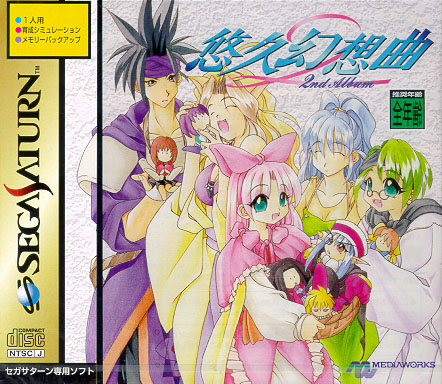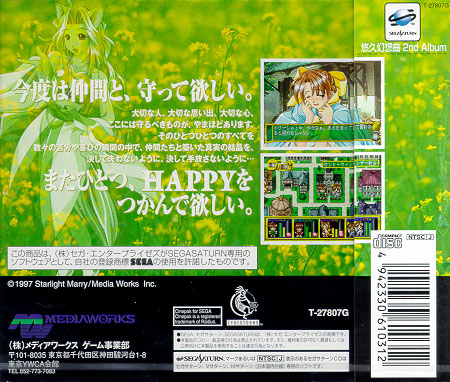
|

| Yukyu Gensokyoku 2nd Album |

|
|

|
|
|
||||||||||||||||||||||||||
| Notas |
| Yukyu Gensokyoku 2nd Album: Game Review The first Yukyu Gensokyoku was published in summer 97. The sequel, Yukyu Gensokyoku 2nd Album, was released in early spring 98. Among these, the Playstation version of 2nd Album is the only one I have played (and is what this review is based on), although it has been reported (by enthusiastic Japanese players who own both versions) that the Saturn version is basically the same, with a few minor differences, in some events and such. Yukyu Gensokyoku is called a "friendship simulation" game, contrasting the now-popular "romance simulation" games. The player is the leader of the 3rd division of the militia police. The task of the 3rd division is to handle various miscellaneous affairs, such as daily chores of the residents. Lately, because of fund cuts from the sponsor, the 3rd division has to charge fees for its services, and consequently it receives far fewer requests than before. In addition, competition from the newly formed public security force, which provides free service, the 3rd division is on the verge of disbandment. The last chance for the 3rd division is a one-year trial period, which is what the game covers. The primary objective of the game is to revive the 3rd division and raise public support for its sustenance by successfully fulfilling requests from town residents. The secondary objective is to develop friendly relations with at least one member of the team. At the start of the game, the player chooses 3 members among 10 available characters (3 male, 7 female). The team of four (including the player character) remains unchanged for the rest of the game, though the remaining characters (and other residents) will show up in events now and then. The core of the game play is the 48-week year. At the beginning of each week, a list of 6 or 7 missions (requests from residents) is displayed, and the player assigns the team members to the missions (one mission per member). The missions require various skills to succeed in; if a character's skills seem inadequate, multiple characters may be assigned to one mission, and they will usually help each other out as long as they do not dislike each other too much. A member may also rest for the week if she is too tired. The week is portrayed on a town map, where the members go to their working places and do their jobs, in some cute-styled graphics. At the end of every week, the player receives money for successful missions (he receives but little money for failed ones), which is mainly used for training, and for paying salary to the other team members at the end of each month. In additional to money, the player also receives public support ("Heroic Gauge", the primary objective of the game). For the members' accomplishment in missions, they also gain "awakening points"; accumulating them enhances the character's ability in combat. Every seventh day is a holiday, when the player may go training to improve his skills, or go and fight in the coliseum (to try to win more money), or go to the hospital to fully recover his condition. He may also go and visit ("play with") a team member, which usually results in a short conversation between the two, but occasionally a longer event may occur. The relationships within the team is indicated by a chart, which specifies the favor each character feels towards every other member. Relationships change during events, and also when multiple members undertake one mission. Taking another member along during training on a holiday is a reliable way of improving the player's relationship with her, but it costs a lot of money. Relationships affect the characters' performance on a mission when multiple characters are assigned. If a team member feels much dislike towards another, she may lose motivation, which would cause her to fail missions frequently. Also, the player's relationships with other team members affect the ending (it's the secondary objective of the game). Among the list of missions every week, there is a "sugoroku" mission (which is renewed every 2 weeks). The player can send the entire team (it has to be either everybody or nobody) on it. The player then plays a "sugoroku" game (think about a mini version of MB's "Game of Life") against one or two rival groups. The contestants take turns spinning the wheel and moving, until one group reaches "goal" and wins. If the player wins, he succeeds in the mission, and he fails if a rival group wins. Sometimes there is combat (in very orthodox RPG style) with monsters or other groups; the loser of a battle loses some money and rests for a turn. Controlling the power with which one spins the wheel to get the number he wants is explicitly considered a legitimate skill in the sugoroku game. Among the weekly routine of mission assignment, working, and holidays, events come up from time to time. Most events in the game are character-specific; they occur only if a certain character is within the team. A event consists of a fair amount of dialog, and usually a few choices the player has to make, like a mini adventure game. Some of the events are more about the personal relationship between the player and another member, but a fair number of them are about the characters trying to respond to a crisis in town. There are light shades of romance in some of the events with the female characters, and all or most of the endings (secondary objective) with the female characters are to some degree romantic. I have not yet encountered any romance elements with male characters (...), only close friendships. Yukyu Gensokyoku 2nd Album offers a comfortable alternative (or addition) to the romance sims. The characters are beautifully drawn in anime-style 2D graphics, and part of the script is spoken by famous voice actors, who do a good job. The game has a believable (primary) objective which is not as shallow as the typical romance sim, in terms of both game story and playability. Also, in my opinion, requiring one to maintain friendly relations within a team of colleagues makes more sense than requiring a boy to go out with every girl he ever meets. The playability is existent, but not rich since this game is basically a character game. Weekly assignments are simple without being trivial, but basically it is very easy to fulfill both the primary and the secondary objectives. There is abundant time to gain the needed public support and friendship, and any "bad status" of a member is easily cured by paying a visit to the hospital, which doesn't cost much money either. This game is not played for "challenge", but for an easy, nice time. I wish the game would display the numeric value of the "heroic gauge" (including any excess beyond the graphical gauge) after the ending, as some kind of score, to avoid the feeling of loss of purpose in the last months of the game when I have already filled the (graphical) heroic gauge. The menus are functional and reasonably convenient. You can fast-forward through events, for example ones you have already seen, and through combat graphical effects, which may quickly become repetitive. The programmers have taken care to ensure that playing the game would be a comfortable experience. The time-consuming "sugoroku" game and the very orthodox combat are basically optional, now in 2nd Album. There are a large number of events, to keep the game interesting for a few (or, to some, many) sessions. The characters are well-written and well-drawn, and their voices are well acted out. Overall, the game offers a pleasurable, comfortable, light-hearted experience. Yukyu Gensokyoku 2nd Album is a character game with passable playability. Japanese literacy, including kanji, is required. (Some of the messages are both spoken by voice actors and subtitled in Japanese, but some are not spoken.) The game is recommended to players who like nice and cute anime-style characters and Japanese voice acting, and a light, sweet, 'nice' game albeit its low challenge. |